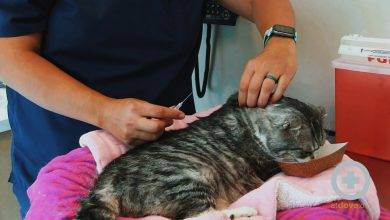When to Euthanize Cats with Nasal Cancer
Discovering that your beloved feline companion has been diagnosed with nasal cancer is a heartbreaking and overwhelming experience. As a devoted pet owner, you want to provide the best care and make the most compassionate decisions for your furry friend. Among the difficult choices you may face, deciding when to euthanize a cat with nasal cancer can be one of the most challenging.
In this blog post, we aim to offer guidance and support to cat owners who find themselves grappling with this heartbreaking decision. While we understand that each cat’s journey is unique, we will explore the factors that can help you navigate this difficult terrain. SULLPET
When to Euthanize Cats with Nasal Cancer
The decision to euthanize a cat with nasal cancer should be made in consultation with a veterinarian, as they can provide personalized guidance based on the cat’s specific condition.
Factors to consider include the cat’s quality of life, pain management options, progression of cancer, and overall well-being. If the cat’s suffering becomes unmanageable and its quality of life significantly declines, euthanasia may be a compassionate choice to prevent further distress.
Also Read: When to Euthanasia Cats with Intestinal Cancer
Recognizing the Symptoms of Nasal Cancer
Cats are masters at hiding their discomfort, making it tricky to spot early signs of nasal cancer. However, there are common symptoms we can look out for. If your cat has been experiencing chronic sneezing, nasal discharge, difficulty breathing, loss of appetite, weight loss, or facial swelling, it’s crucial to consult a veterinarian promptly. Early detection plays a vital role in providing the best possible care for our furry companions.
Also Read: How to Tell if Your Cat Has a Fever Without a Thermometer
Veterinary Diagnosis and Prognosis
When faced with potential nasal cancer, a visit to the veterinarian becomes paramount. They will conduct a thorough examination, which may include imaging tests like X-rays or CT scans, and possibly a biopsy.
Through these diagnostic procedures, the veterinarian will assess the extent of cancer and provide a prognosis based on factors such as tumor size, location, and stage. Understanding the prognosis helps us evaluate treatment options and make well-informed decisions.
Also Read: Why Do Cats Like Ice Cubes?
Treatment Options for Nasal Cancer in Cats
Treatment options for nasal cancer in cats vary depending on factors like the cancer stage and the overall health of our feline companions. Treatment may involve surgery, radiation therapy, chemotherapy, or immunotherapy.
Each approach has its own benefits and limitations, and discussing the available options with a veterinary oncologist is essential. Together, we can determine the best course of action for our beloved cats.
Weighing Quality of Life: Considering Euthanasia
Our priority as cat owners is the well-being and quality of life of our furry family members. In cases where nasal cancer becomes advanced or treatment options are limited, making the difficult decision of euthanasia may be the most compassionate choice to prevent unnecessary suffering. However, this decision is deeply personal and should be made in consultation with our veterinarian. It requires careful consideration of our cat’s condition, comfort, and overall quality of life.
Signs that Euthanasia May be the Right Decision
Determining when it’s time to consider euthanasia for a cat with nasal cancer can be emotionally challenging. We should pay attention to signs that our cat may be experiencing unmanageable pain, difficulty eating or breathing, loss of interest in activities they once enjoyed, or consistently poor quality of life. These indicators serve as a guide, helping us make a compassionate decisions for our beloved companions.
Consulting with Your Veterinarian
When faced with the difficult decision of euthanasia, it’s essential to have open and honest communication with our veterinarian. They are experienced professionals who can offer guidance and support during this trying time. Discussing our concerns, and asking questions about our cat’s condition, treatment options, and prognosis will help us gain clarity and make the best decision for our furry friends.
Coping with the Decision and Saying Goodbye
Saying goodbye to our cherished pets is an incredibly emotional experience. It’s important to take the time to process our feelings and find solace in the memories we’ve shared.
Creating a peaceful and comfortable environment for our cat’s final moments, with familiar scents, gentle music, and the presence of loved ones, can help provide comfort and closure. It’s natural to grieve, and seeking support from friends, family, or even pet bereavement counselors can provide valuable assistance during this challenging time.
Seeking Support and Resources
Dealing with a cat diagnosed with nasal cancer and making end-of-life decisions can be overwhelming. Thankfully, there are support groups, online forums, and local organizations that specialize in pet loss and bereavement. These resources offer emotional support, guidance, and a safe space to share our thoughts and feelings with others who understand the journey we’re going through.
Conclusion
Deciding when to euthanize a cat with nasal cancer is a deeply personal choice that requires careful consideration. Remember, you are your cat’s advocate, and your love and compassion will guide you in making the best decision for them. Lean on the support of veterinary professionals, friends, and fellow pet owners to navigate this challenging time, and cherish the precious moments you have with your beloved companion.





